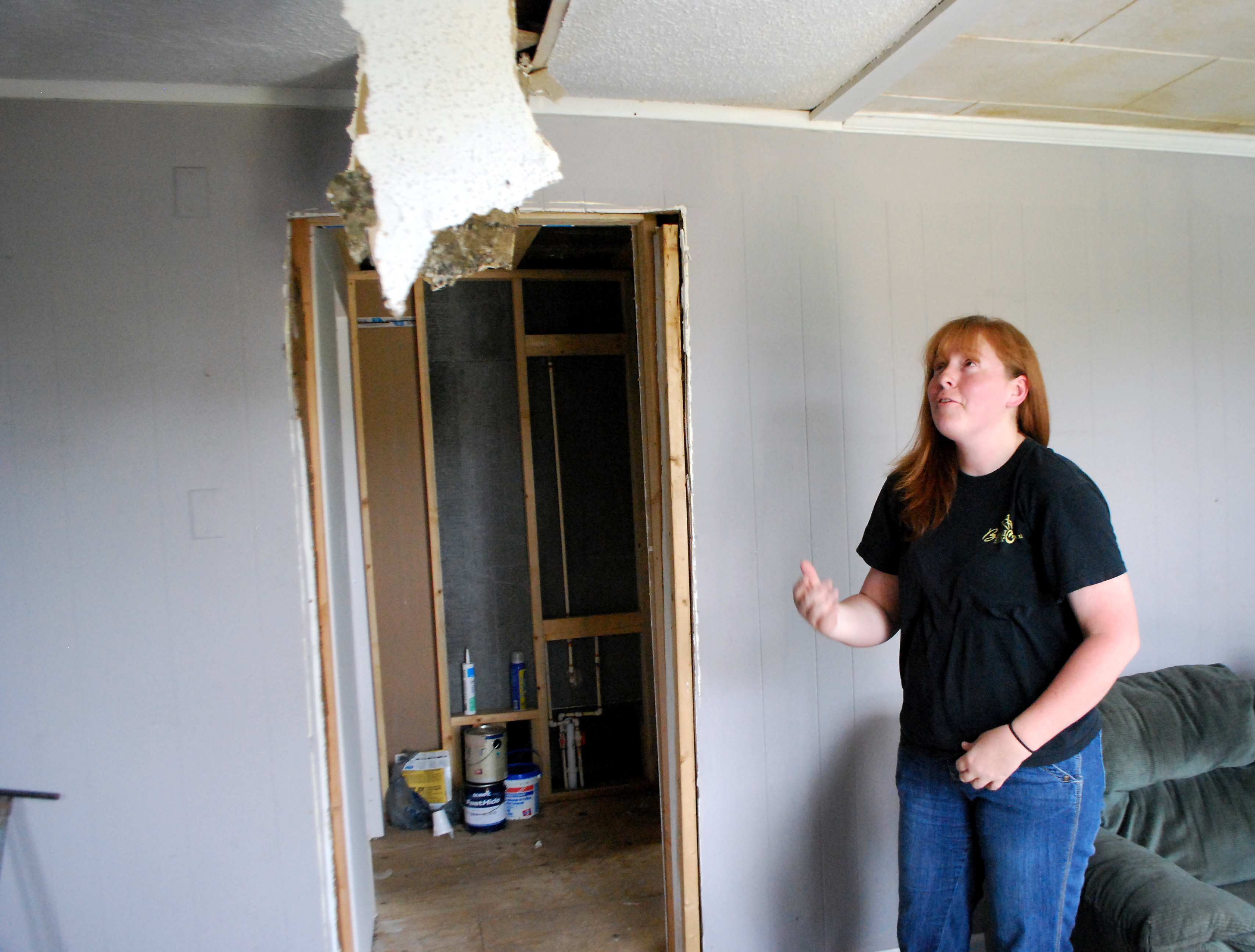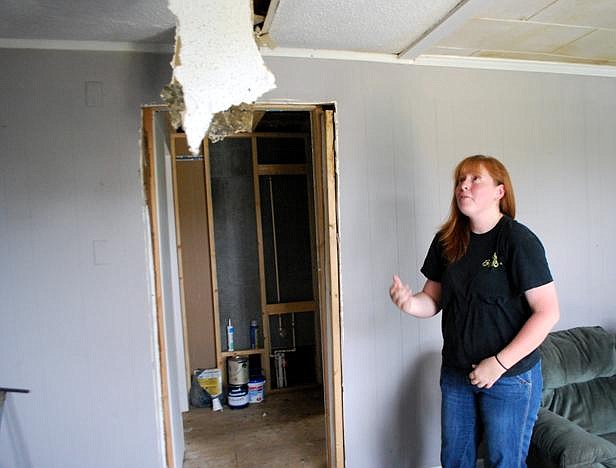 Linda Moore shows where ceiling tiles have begun to fall down in their Cleveland, Tenn., home after an April 27 tornado tore off the roof. The Moores have tried to get assistance from the Federal Emergency Management Agency but have had their claim denied several times.
Staff Photo by Mariann Martin/Chattanooga Times Free Press
Linda Moore shows where ceiling tiles have begun to fall down in their Cleveland, Tenn., home after an April 27 tornado tore off the roof. The Moores have tried to get assistance from the Federal Emergency Management Agency but have had their claim denied several times.
Staff Photo by Mariann Martin/Chattanooga Times Free PressCLEVELAND, Tenn. - Ron and Linda Moore say Federal Emergency Management Agency representatives told them yes, they would be getting financial aid to help them recover from the tornado that ravaged their home.
Then FEMA turned around and denied their claim, but officials later decided the Moores did qualify and resubmitted the paperwork - only to be denied again.
Yet on Monday, FEMA deposited about $1,500 in their bank account, but they're afraid to touch it, worried that it will be taken away.
The Moores just want the emotional roller coaster to end.
In the nearly four weeks since the tornado tore the roof off their three-bedroom, blue frame house on Dalton Pike and threw it across the neighbors' trees, they've waited to see if they will get a grant to replace their rain-soaked belongings and help them pay for temporary housing.
"The up and down has been the worst part," 39-year-old Ron Moore said. "It's a vicious circle that never ends."
The couple sat on the porch outside their empty home, surrounded by downed trees with browning leaves and piles of ruined belongings that the couple lugged outside in the weeks since the tornado. Inside, ceiling tiles, stained brown by rain, dangled, and wet carpet squished underfoot.
"I'm on the verge of a nervous breakdown," said Linda Moore, 36, who has spent hours calling FEMA representatives, in-between working as a certified nursing assistant and caring for their three teenage sons. She clutched a gray-and-green folder filled with paperwork neatly tabbed into categories.
"They finally deposited this money in our bank account, but we're afraid to spend it. The last they told us was our claim was denied," she said.
Greg Hughes, a spokesman for FEMA, said he could not comment on a specific applicant's information, but forwarded the email to a FEMA employee.
FEMA "will contact this family with an answer soon," Hughes wrote.
The Moores rode out the tornado at a friend's house and came back home on April 27 to find the roof ripped off their porch and home. When they contacted their insurance agency, they were stunned to find out they were no longer insured by Allstate, which had insured the home - their first - when they bought it in 2005.
Two years ago, when the family got behind on mortgage payments after Ron lost his job and was unemployed for 15 months, Wells Fargo modified their mortgage under the federal modification program. At that time, Wells Fargo dropped the Allstate policy and began paying a "force-placed" policy with escrow funds without notifying them, the Moores said.
The policy only covers the structure and not the belongings. Their structural damage was assessed at $52,000, but the insurance agency has not paid yet.
"I would have bought additional insurance if I would've known it," Linda said.
Faced with thousands of dollars in damage to their belongings, Linda applied to FEMA the first day the assistance was available. When FEMA employees said they likely would qualify, the Moores sighed with relief.
Over the next three weeks, the Moores were told their direct deposit for temporary housing would be made within days, were asked to fax detailed papers showing that their insurance policy would cover only structural damage and were told repeatedly that FEMA had all the paperwork it needed. They were told their claim was denied twice, but then told it was being resubmitted because they still qualified.
"Its a terrible thing to sit back and watch someone go through all this," said Carolyn Elrod, a family friend who has opened her home to the Moores.
One FEMA letter said their claim was denied because their home, where daylight can be seen peeking through the ceiling, was still livable.
One FEMA representative told them that, because the insurance would pay for more than FEMA's $30,200 cap, FEMA could not help. Hughes confirmed that $30,200 is the cap for FEMA money but he said that amount is not determined by an insurance payout.
On Monday, FEMA deposited enough money in their bank account to cover a deposit and first month's rental payment for temporary housing, but has not said if it will help cover their belongings.
Ron Moore, a burly man dressed in a gray T-shirt and jeans who now works as a corrections officer for the Bradley County Sheriff's Office, clenched and unclenched his fists as he described the last month.
"It's tearing me up," he said. "I see my wife crying - we've been married 18 years - and there is nothing I can do to fix it. I can fix a car, I can work on the house, but this ... I can't do anything."
If they received a final denial letter, they could appeal or apply for a loan, Linda Moore said. Now they are hanging in limbo.
She broke down in tears when she talked about their sons, ages 18, 17 and 15. The 18-year-old graduated while the family has been homeless. The 17-year-old celebrated a birthday, hosted by generous friends.
"They need a place to live," she said.
"It's not like I want them to write me a check for a million bucks," her husband added. "I don't want no extras. But if you say you are here to help, then help."
Contact staff writer Mariann Martin at mmartin@timesfreepress.com or 706-980-5824.
